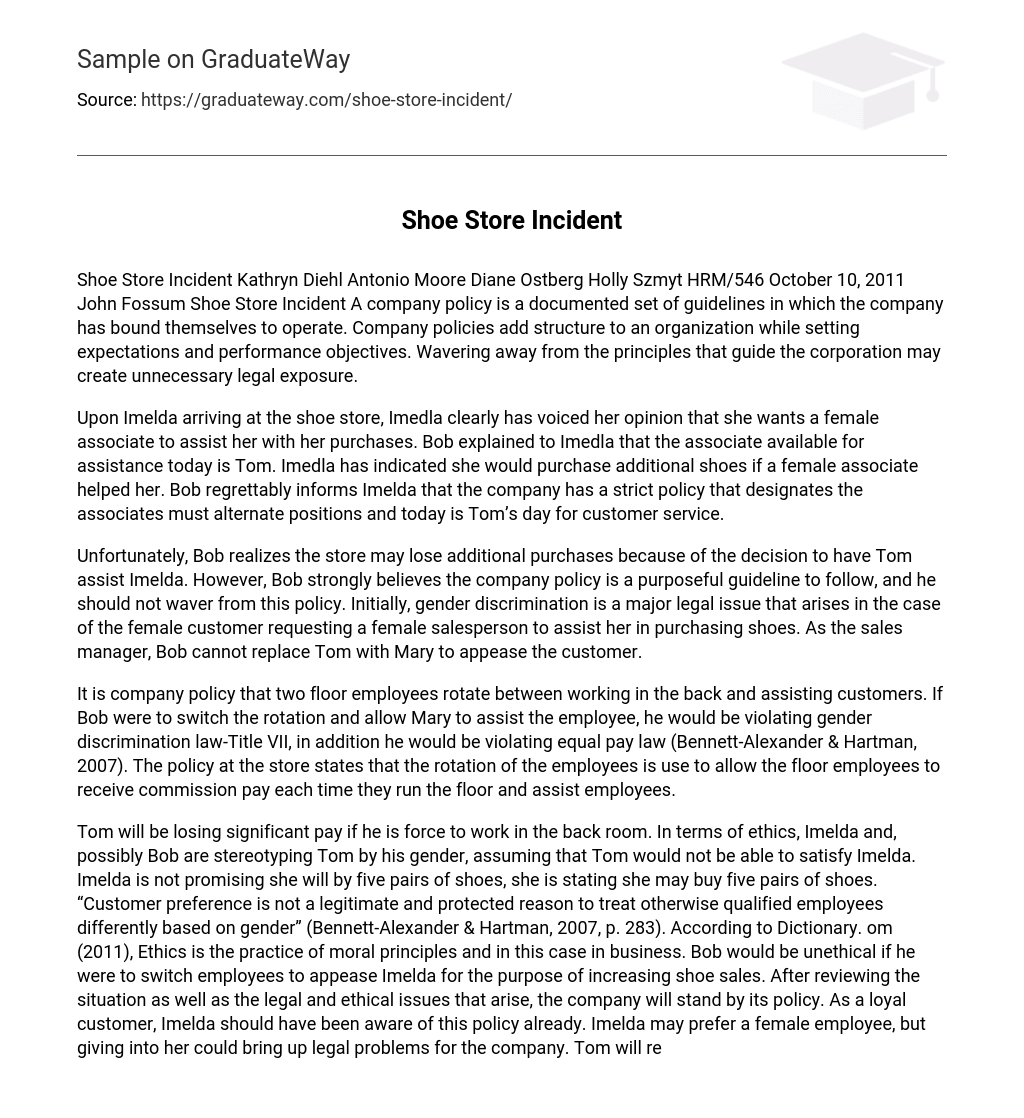A company policy is a written set of guidelines that a company has committed to following. Company policies provide structure to an organization and define expectations and performance goals. Deviating from the guiding principles of the corporation can result in potential legal risks.
Upon arriving at the shoe store, Imelda made it clear that she preferred a female associate to assist her with her purchases. Bob informed Imelda that the only available associate for assistance today was Tom. Imelda expressed that she would consider purchasing more shoes if a female associate helped her. Unfortunately, Bob had to inform Imelda that the company has a strict policy of alternating associates’ positions, and today was Tom’s day for customer service.
Unfortunately, Bob acknowledges the possibility of losing more sales due to the decision to have Tom assist Imelda. However, Bob firmly believes in adhering to the company’s policy as a deliberate rule and feels it should not be compromised. The primary legal concern in this situation is gender discrimination, specifically regarding the female customer’s preference for a female salesperson. In his capacity as the sales manager, Bob is unable to accommodate the customer by replacing Tom with Mary.
According to company policy, two floor employees must take turns working in the back and assisting customers. If Bob were to change the rotation and let Mary assist the employee instead, he would be breaching the gender discrimination law – Title VII, as well as the equal pay law (Bennett-Alexander & Hartman, 2007). The store’s policy specifies that the rotation of employees aims to enable the floor employees to earn commission pay every time they work on the floor and assist employees.
Tom may face a significant pay loss if he is compelled to work in the back room. Imelda and potentially Bob are showing bias against Tom based on his gender, assuming that he would be unable to satisfy Imelda. It is important to note that Imelda is not guaranteeing the purchase of five pairs of shoes, but rather indicating a possibility. “Treating qualified employees differently based on gender solely due to customer preference is not a legitimate or protected reason” (Bennett-Alexander & Hartman, 2007, p. 283).
According to Dictionary om (2011), Ethics refers to the application of moral principles, particularly in the context of business. If Bob were to transfer employees to satisfy Imelda’s desire for increased shoe sales, it would be considered unethical. Upon careful consideration of the situation and the associated legal and ethical concerns, the company will uphold its policy. As a loyal customer, Imelda should have already been aware of this policy. Although Imelda may express a preference for a female employee, succumbing to her request could lead to legal complications for the company. If Mary assisted Imelda, Tom will receive the commission for her work.
If Tom decides to give Mary the commission for Imelda’s purchase, he would be depriving himself of that day’s earnings. While Bob may be losing some sales by enforcing this policy, he is prioritizing the well-being of the employees and the overall company. However, it would be beneficial for Bob to allow Imelda to reach out to the corporate office and provide her input on the company’s policy. By doing so, she will have a say in the matter and may reconsider making future purchases. In summary, the shoe store incident exemplifies that companies implement policies with a clear purpose.
The text highlights the positive outcome of adhering to company policies. It emphasizes the importance of customers comprehending the company’s commitment to safeguarding itself from legal complications. It also recognizes the management team for diligently implementing and staying informed about the company’s policies and any potential violations of the law.
References
- Bennett-Alexander, D. D. , & Hartman, L. P. (2007).
- Employment Law for Business (5th ed. ). New York, New York: McGraw-Hill Companies. ethics. (2011).





